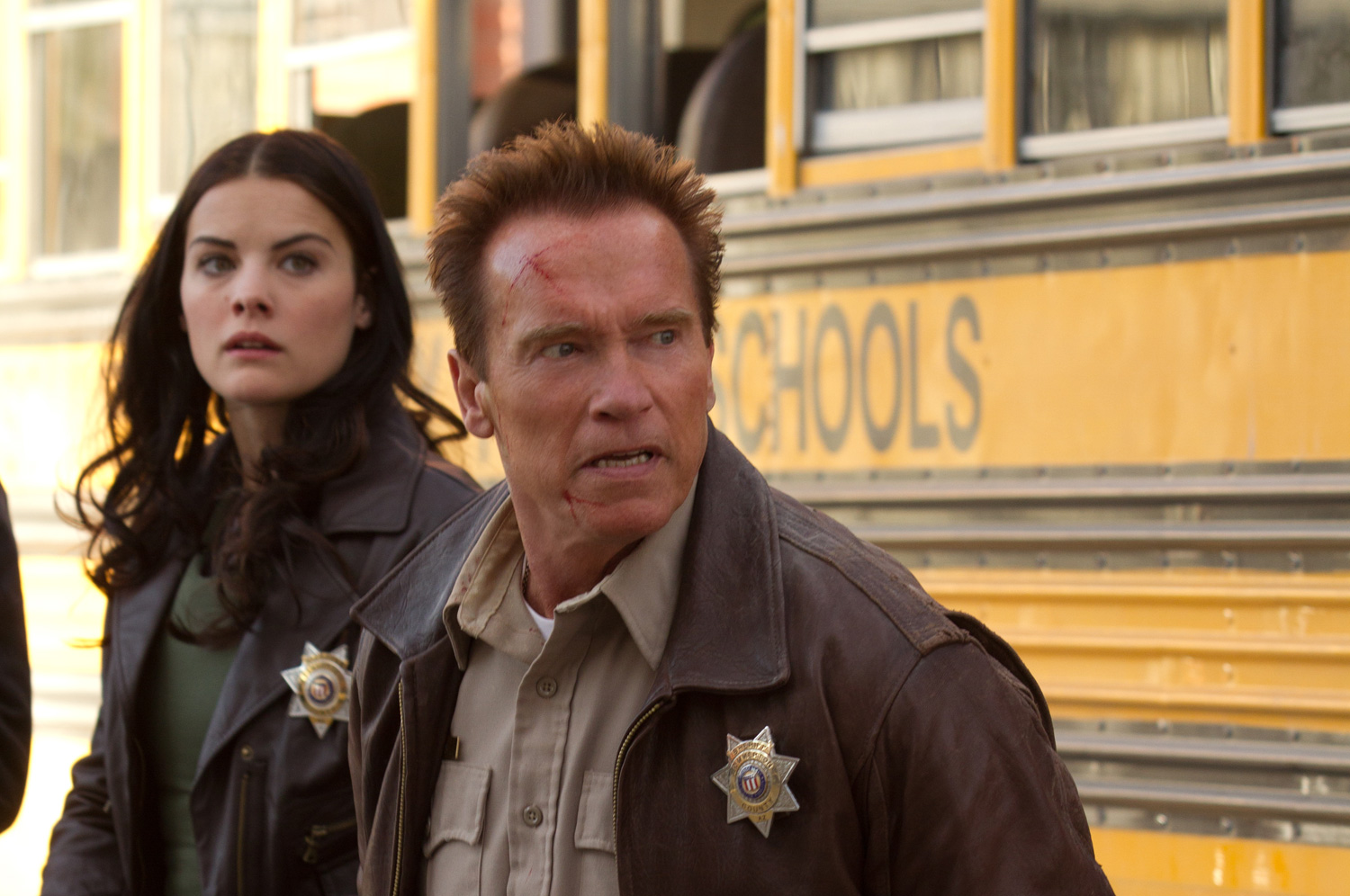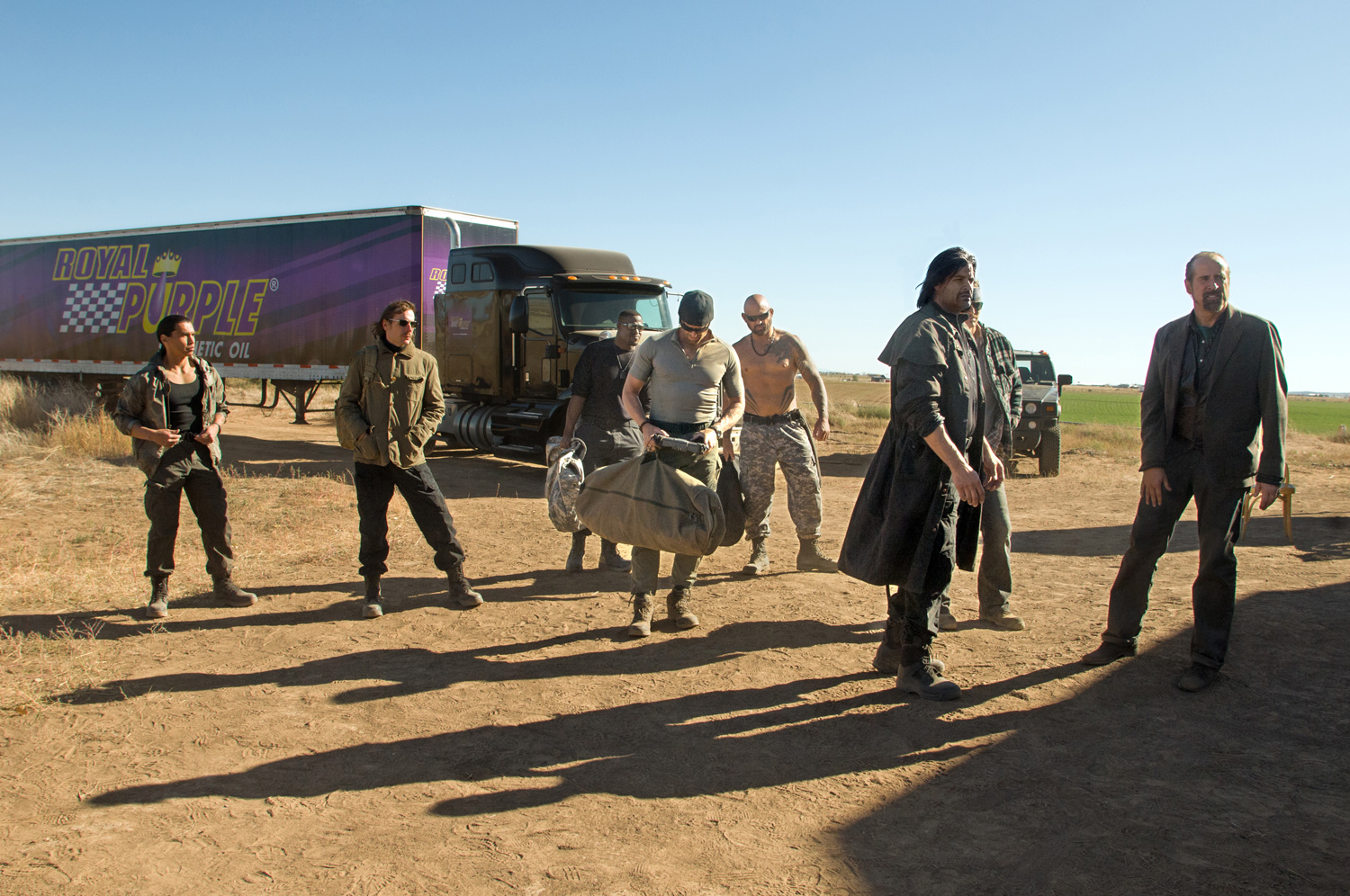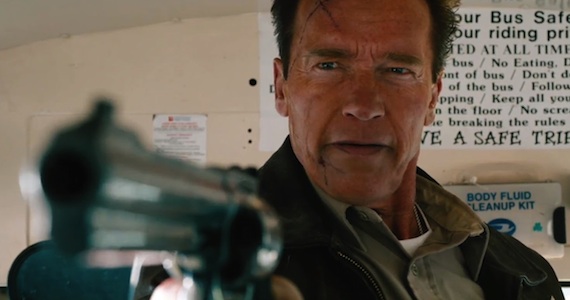|
If
this is Arnold Schwarzenegger's comeback then his best days are behind
him.
After ending his political career as Governor of California, this is
the
Austrian's first solo vehicle in ten years: a colossal fizzer that
would leave
his most adamant fans impatient by the halfway mark. On its first
weekend in
the US, the film opened at a miserable ninth place, collecting just six
million
dollars and never looked like improving. How did this happen to one of
the most
recognised action heroes in movie history?
Age
isn't a factor to me. Schwarzenegger is now
sixty-five, which might seem like zimmer frame territory for his work,
but
there are older stars like Clint Eastwood who are still raking in the
dollars.
Bluntly, Schwarzenegger hasn't made a great film since the Nineties.
The Terminator films
still rate as the apex of the
modern action genre, but the series faded after the second movie. His
best
films were always boosted by a mixture of humour and technology, and
the
ability to soften the malice of the violence through one-liners and
clever
self-parody. However, these are no longer his own idiosyncratic
qualities to make
him seem unique again.

The
high level of gory violence that marked his early films
is now frowned upon by studios because it weakens the bankability and
the
likelihood of roping in younger demographics. Ideologically, Arnold
also
belongs in a bygone era too. He is a renowned Republican, who once
admired Richard
Nixon. His films are similarly ingrained in archaic,
conservative
values of one man, separate from government, who can save the world.
But this
culture of Reaganism is dead now and action films, like The Dark Knight,
have becomes infinitely more
sophisticated in blurring the lines between good and evil.
Nonetheless, The Last Stand is
as conservative a film as Schwarzenegger has ever made. He plays
Sheriff Ray
Owens, who guards the dusty town of Sommerton in Arizona. He's
surrounded by a small
ground of deputies, which include: Mike (Luis Guzmán),
Sarah (Jaimie Alexander) and Jerry (Zach Gilford).
They deal with the town's small problems and eccentrics, including
Lewis Dinkum
(Johnny Knoxville), who is a weapons collector and local inmate Frank
(Rodrigo
Santoro). Ray is also suspicious of a pair of seedy goons that are
making their
way through the town, one of whom is named Burrell (Peter Stormare).

Meanwhile
in L.A., Gabriel Cortez (Eduardo Noriega) is a dangerous criminal who
has
escaped custody. Pursued by Agent John Bannister (Forest Whitaker),
Cortez uses
a high powered sports car to elude capture and takes a female agent
hostage. He
plans on crossing the Mexican border via a bridge through Sommerton.
Ray and
his team have to prepare for a surge by Cortez and his mini army of
highly
powered thugs, who are looking for a clear exit route.
There
are vague strands of a Western here, with Schwarzenegger playing the
role of an
honest lawman, who wants to protect his town against the more
contemporary city
folk. But for a long period the film is terribly lethargic, devoid of
energy,
and its narrative contains no surprises, lacking a unique story hook or
concept. Korean director Jee-woon Kim's also makes the fatal flaw of
relegating
the film's megastar to the backseat. Too much time is spent with
Cortez's
sports car, a painfully indiscreet vehicle for someone evading the law,
and
having the side characters dominate the action scenes.

Arnold
only becomes involved in the second half but few of the stunts seem to
test his
ageing joints. His first big action scenes, firing a shotgun from a
truck and
unloading a Gatling gun from the back of a school bus, both have him
sitting
stationary. His character is also caught between two conflicting tones.
In the
first half there are close-ups of Arnold's weathered, stony face,
examining his
wrinkles and fake tan, as he fires off lines like: "I've seen enough
blood
and death. I know what's coming."
But
late in the film, Kim also tests his hand with
slapstick comedy and then fetishising those high powered weapons. It
doesn't
gel and Kim's choppy visual style leaves the action cold too. The only
distinct
set pieces are the two climaxes: one in a cornfield with hidden cars
and then a
clumsily staged and embarrassing showdown on a bridge. This over-edited
fistfight combines the worst of Lethal Weapon and
World Wrestling, on top of a cringing, conservative message about
keeping
illegal immigrants at bay.

Perhaps
with all that gunfire though, Arnold's film didn't fail because it was
dated.
Instead, maybe his most lead-heavy films, especially this one, are a
sad
reminder of those real would-be cowboys today, who'd like to look down
the
scope of their guns and say: "I'm the sheriff."
|